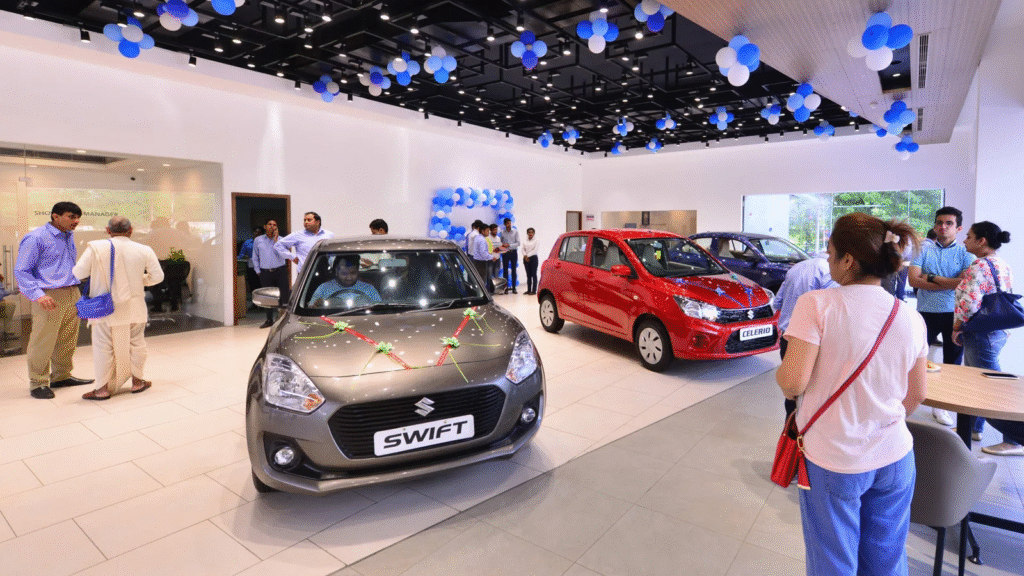The Indian automobile sector traditionally experiences a surge in demand during the festive period. With major festivals like Navratri, Dussehra, and Diwali driving consumer sentiment, this time of year is often viewed as the most lucrative window for manufacturers and dealers.
However, this year, festive season auto sales could face a significant slowdown — and the reason is rooted in customer uncertainty over Goods and Services Tax (GST) policies.
Despite attractive discounts, new product launches, and dealer-level incentives, many buyers are reportedly holding back their purchase decisions. At the heart of this hesitation is the lack of clarity over potential GST revisions on automobiles, which is creating confusion and anxiety in the minds of consumers.
This TazaJunction.com article explores the reasons behind the slowdown, the impact of GST-related confusion, and how it could affect the broader auto market during India’s most critical sales period.
Table of Contents
Festive Season: A Crucial Time for the Auto Industry
For decades, the festive period has been the backbone of India’s auto sector performance. Around 30–40% of annual vehicle sales typically occur between September and November. The season combines emotional, cultural, and financial triggers:
- Auspicious days like Dhanteras and Diwali
- Year-end bonuses and financing offers
- New model launches timed for maximum visibility
- Attractive exchange programs and festive discounts
Every stakeholder — from OEMs to financiers to dealers — banks on this window to boost performance and clear inventory. But this year, early indicators suggest that festive season auto sales may not meet industry expectations.
Also, you can explore the implications of flash-charging buses, hydrogen trucks, and other initiatives that are key to the India transport future.
The Role of GST in Auto Buying Decisions
GST plays a major role in determining the on-road price of a vehicle. Currently, automobiles attract one of the highest tax rates under the GST regime. Passenger vehicles are taxed at 28% GST, along with an additional cess ranging from 1% to 22%, depending on the type and engine capacity of the vehicle.
There have been ongoing discussions within government and industry circles about rationalizing these rates. Proposals have included reducing GST on electric vehicles (EVs), two-wheelers, and entry-level cars to boost affordability and demand. However, no firm announcements have been made, leaving buyers unsure whether to purchase now or wait for possible rate cuts.
This uncertainty has a direct impact on festive season auto sales, as customers fear making a purchase today that could become cheaper in a few weeks or months.
Customer Behavior: Waiting in Uncertainty

Customer sentiment, while generally positive during the festive period, appears more cautious this year. According to industry insiders, footfalls at dealerships are steady, but conversion rates remain lower than usual. Buyers are expressing interest but delaying final decisions.
Some key reasons include:
- Speculation about upcoming GST cuts
- Confusion over potential tax benefits for electric and hybrid vehicles
- Mixed signals from government bodies and media
- Concerns about resale value if tax rules change post-purchase
In short, customers are in a holding pattern. And unless the government offers immediate clarity, festive season auto sales might fail to capitalize on traditional buying sentiment.
Dealers and OEMs Feel the Pressure
Automobile dealers, who typically prepare for the festive season by increasing inventory, are facing added pressure this year. High unsold stocks combined with lower-than-expected bookings are leading to cash flow issues and discount wars in some regions.
OEMs (Original Equipment Manufacturers) are also walking a tightrope. While they are ready with festive launches and offers, the lack of policy clarity means they are unable to assure buyers of stable pricing. This creates a gap between marketing optimism and ground-level reality.
The uncertainty over GST is not just impacting customer confidence — it’s shaking the entire ecosystem that supports festive season auto sales, from logistics to finance to after-sales service planning.
Impact on Different Vehicle Segments
Let’s break down how this GST confusion is affecting various categories within the auto sector:
1. Two-Wheelers
Often considered a mass-market product, two-wheelers are highly price-sensitive. Even a minor revision in GST can significantly impact affordability. As a result, many rural and semi-urban consumers are adopting a wait-and-watch approach.
2. Entry-Level Cars
First-time car buyers are reconsidering their timing, especially for petrol hatchbacks. If GST changes are announced soon, they could mean a difference of ₹20,000–₹50,000 per car.
3. Electric Vehicles (EVs)
EVs are in a unique spot. While they currently enjoy a reduced GST rate (5%), buyers are unsure if further incentives or tax credits will be introduced. This is especially affecting new adopters who want to make an informed investment.
4. Luxury Cars and SUVs
Although high-end buyers are less price-sensitive, even luxury dealers report postponed bookings. In this segment, a GST revision could mean savings of several lakhs, so customers prefer to delay purchases until there’s certainty.
Across all categories, festive season auto sales are being influenced by GST-related speculation and hesitancy.
Industry Demands for Clarity
Multiple industry bodies have formally requested the government to clarify its stance on GST for the automotive sector. The Society of Indian Automobile Manufacturers (SIAM) and Federation of Automobile Dealers Associations (FADA) have both submitted memorandums, asking for:
- Immediate clarification on whether GST rate cuts are planned
- Timelines for any potential changes
- Differentiation in GST rates for EVs vs ICE (internal combustion engine) vehicles
- Consideration for temporary relief during the festive quarter
Industry leaders argue that even a “no change” statement would be better than silence, as it would help restore confidence and revive the momentum of festive season auto sales.
Government’s Position So Far
The government, for its part, has acknowledged the concerns but has yet to make any concrete announcements. In recent interviews, Finance Ministry officials have suggested that tax rationalization is “under review” and that long-term changes will be aligned with sustainability goals.
However, without a fixed timeline or policy paper, this leaves both buyers and sellers in a lurch. Unless clarity is provided soon, the confusion could stretch beyond the festive season and impact the next quarter as well.
What Can Be Done Now?
To protect the vibrancy of festive season auto sales, the following steps could prove beneficial:
- Public Communication: A clear government statement about GST intentions — even if it’s to confirm no changes in the short term — would greatly stabilize the market.
- Flexible Offers from OEMs: Manufacturers could introduce limited-time schemes that offer GST-adjusted refunds if rates change soon after purchase.
- Dealer Training: Sales staff should be trained to manage buyer expectations and provide accurate information on GST-related concerns.
- Industry-Government Dialogue: Fast-tracking discussions with stakeholders can help preempt panic and ensure a smoother policy rollout in the future.
Looking Ahead: The Bigger Picture
While GST clarity is a pressing short-term issue, the broader concern is policy unpredictability. For the auto sector to grow sustainably, consistency and advance communication from regulators are essential. Sudden changes or ambiguous signals hurt not just one quarter’s performance but the trust that underpins consumer confidence.
The festive season auto sales narrative is a reminder of how taxation and policy uncertainty can disrupt even the most reliable sales cycles. Going forward, all stakeholders must prioritize transparency, coordination, and long-term planning.
Final Thoughts
India’s festive season has always been a celebration of new beginnings — and for many, that includes a new vehicle. But in 2025, buyers are hesitating not because they lack the desire to purchase, but because they lack clarity on how much they might have to pay.
The GST uncertainty is casting a shadow over what should be the brightest season for the auto industry. Unless urgent action is taken to address consumer concerns, festive season auto sales could fall short, impacting not just dealers and manufacturers, but the economy at large.
A confident buyer is a buying buyer — and right now, clarity is the missing piece that can unlock the true potential of this festive season.

